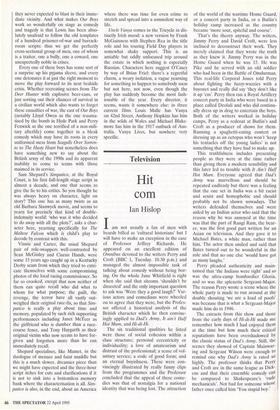Television
Hit corn
Ian Hislop
Iam not usually a fan of men with beards billed as 'cultural historians' but I will have to make an exception in the case of Professor Jeffrey Richards. He appeared on an excellent edition of Omnibus devoted to the writers Perry and Croft (BBC 1, Tuesday. 10.30 p.m.) and managed the almost impossible task of talking about comedy without being bor- ing. On the whole June Whitfield is right when she said that sitcoms 'shouldn't be dissected' and the only important question to ask was 'Were they a good laugh?' Var- ious actors and comedians were wheeled on to agree that they were, but the Profes- sor offered a historical analysis of the British character which he then convinc- ingly applied to Dad's Army, It ain't Half Hot Mum, and Hi-di-Hi.
The six traditional qualities he listed were those of social cohesion within a class structure; personal eccentricity or individuality; a love of amateurism and distrust of the professional; a sense of vol- untary service; a code of good form; and an eternal boyishness. These were con- vincingly illustrated by really funny clips from the programmes and the Professor concluded that the appeal of these come- dies was that of nostalgia for a national identity that was being lost. The attraction
of the world of the wartime Home Guard, or a concert party in India, or a Butlin's holiday camp increased as the country became 'more sour, spiteful and coarse'.
That's the theory anyway. The writers, Jimmy Perry and David Croft, were less inclined to deconstruct their work. They merely claimed that they wrote the truth as they knew it. Jimmy Perry was in the Home Guard when he was 15. He was Pike and he served with an old soldier who had been in the Battle of Omdurman. This real-life Corporal Jones told Perry about fighting the fuzzy-wuzzies with a bayonet and really did say 'they don't like it up 'em'. Perry then ran a Royal Artillery concert party in India who were based in a place called Deolali and who did continu- ally dress up in drag to entertain the boys. Both of the writers worked in holiday camps, Perry as a redcoat at Butlin's and Croft as a producer of shows for them. Running a spaghetti-eating contest or dressing up as an octopus who won't 'keep his tentacles off the young ladies' is not something that they have had to make up.
This truthfulness includes presenting people as they were at the time rather than giving them a modern sensibility and this later led to trouble with It Ain't Half Hot Mum. Everyone agreed that Dad's Army was marvellous and should be repeated endlessly but there was a feeling that the one set in India was a bit racist and sexist and homophobic and should probably not be shown nowadays. The writers defended themselves, and were aided by an Indian actor who said that the reason why he was annoyed at the time was that the part of Rangi Ram, the bear- er, was the first good part written for an Asian on television. And they gave it to Michael Bates, a white man, rather than him. The actor then smiled and said that Bates turned out to be wonderful in the role and that no one else 'would have got as many laughs.'
Perry pleaded authenticity and main- tained that 'the Indians were right' and so was the ultra-camp bombardier Gloria, and so was the splenetic Sergeant-Major. The reason Perry wrote a scene where the whole party is made to run around at the double shouting 'we are a load of poofs' was because that is what a Sergeant-Major made, him do in 1946.
The extracts from this show and those from the early days of Hi-di-Hi made me remember how much I had enjoyed them at the time but how much their critical reputations have been overshadowed by the classic status of Dad's Army. Still, the scenes they showed of Captain Mainwar- ing and Sergeant Wilson were enough to remind one why Dad's Army is rated so highly. The professor thinks that Perry and Croft are in the same league as Dick- ens and that their ensemble comedy can be compared to Shakespeare's 'rude mechanicals'. Not bad for someone whose father once called him 'You stupid boy.'


























































 Previous page
Previous page